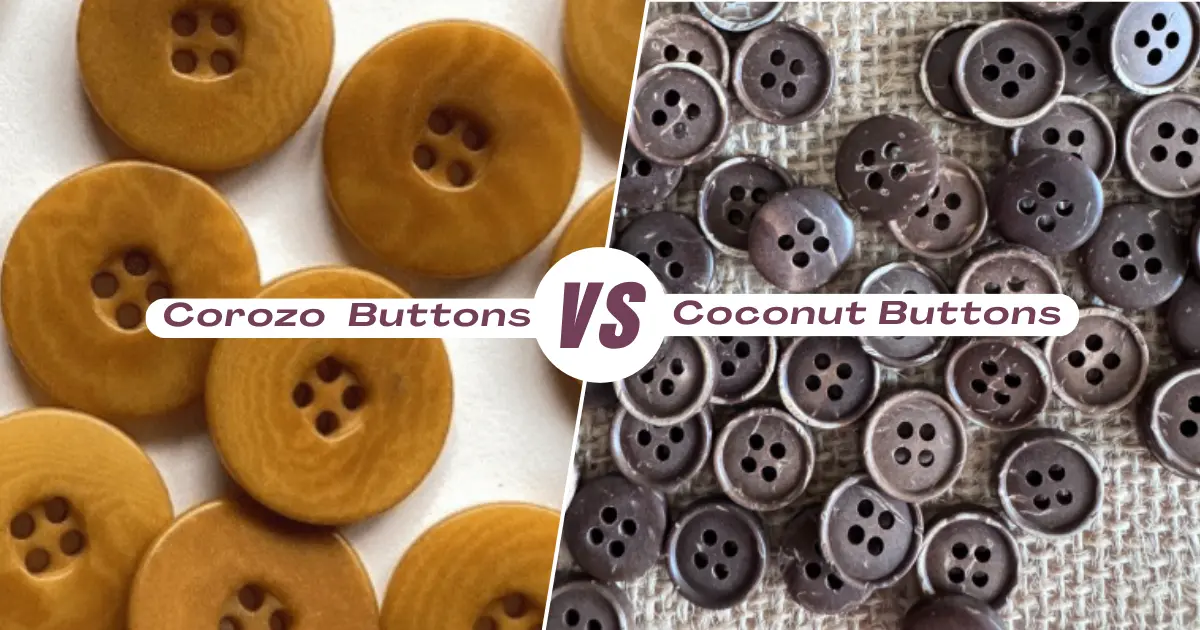
Fashion designers and clothing producers are scrutinizing every single aspect of their products, including horn buttons, in a world where sustainability has become a business requirement rather than a marketing gimmick. The decision between natural button materials has never been more important, as consumers are increasingly calling on companies to be more environmentally accountable.
There are two eco-friendly options that are becoming leaders in the field of the eco-friendly fashion industry: the so-called vegetable ivory (corozo buttons) and coconut buttons. Each of them has strong environmental credentials and unique aesthetic features, yet which one is closer to what your brand values and what practical necessity needs?
Corozo buttons are also made out of the tagua nut, which grows on the palm tree that is found in rainforests in South America. These are spectacular seeds that naturally become hard, like ivory, giving them their suggestive name.
By buying corozo buttons wholesale in large quantities using suppliers such as Chetna International, you are buying a material that will have a remarkable degree of longevity and a highly lustrous and classy surface, giving a close resemblance to plastic or natural horn.
The Coconut buttons have one more value proposition in the market of sustainable buttons. Made out of coconut shells that are a byproduct of the coconut industry that would otherwise be discarded or burned, these buttons are a real example of a circular economy.
By ordering coconut buttons in bulk in large quantities from Chetna International, the brands are not only actively engaging in recycling waste but also contributing to the development of agricultural communities in tropical areas where coconut farming is a source of the required livelihoods.
The choice of corozo or coconut buttons is eventually determined by your branding, target, and product specification. Corozo buttons are priced higher but provide better performance, durability, and versatility, which is why they are used in high-end garments, custom creations, outerwear, and products when the integrity of the wholesale buttons needs to be the highest over the years of use.
Coconut buttons, in their turn, have the highest sustainability profile and cost-efficiency, especially in casual wear, children's wear, resort wear, and those brands that focus on their environmental story as their primary brand value.
Chetna International collaborates with brands to analyze their particular requirements, be it the ideal wood button in a natural fiber range, gold buttons of the luxurious range, or the best proportion of corozo and coconut buttons to each line in your collection. We specialize in wholesale buttons and can help you go through the process of sampling, ordering, and quality control to have your button selection strengthen rather than undermine your design concept.
1. What's the main difference in durability between corozo and coconut buttons?
Ans. Corozo buttons offer superior durability due to the tagua nut's dense, ivory-like structure. Coconut wood buttons, while reasonably durable for everyday wear, are slightly more porous and better suited for casual garments with moderate wear expectations.
2. Are coconut buttons more sustainable than corozo buttons?
Ans. Both options are highly sustainable, but in different ways. Coconut buttons have a slight edge as they're made from agricultural waste that would otherwise be discarded or burned, embodying true circular economy principles. Corozo buttons come from sustainably harvested tagua nuts from South American rainforests, supporting forest conservation.
3. How does pricing compare, and which offers better value for wholesale orders?
Ans. Coconut buttons are generally more cost-effective, making them excellent for brands balancing sustainability with budget constraints, particularly for children's wear or large-volume casual collections. Corozo buttons command premium pricing due to their superior durability, aesthetic versatility, and luxurious finish.
Coconut and corozo wholesale buttons are both valid requests in terms of commitment to sustainability, but they are applied to different brand needs and market positions with advantageous differences. Visit us on the web and look through our full line, and see how the correct choice of sustainable buttons can bolster your environmental commitment to the brand and also improve the quality of your product.